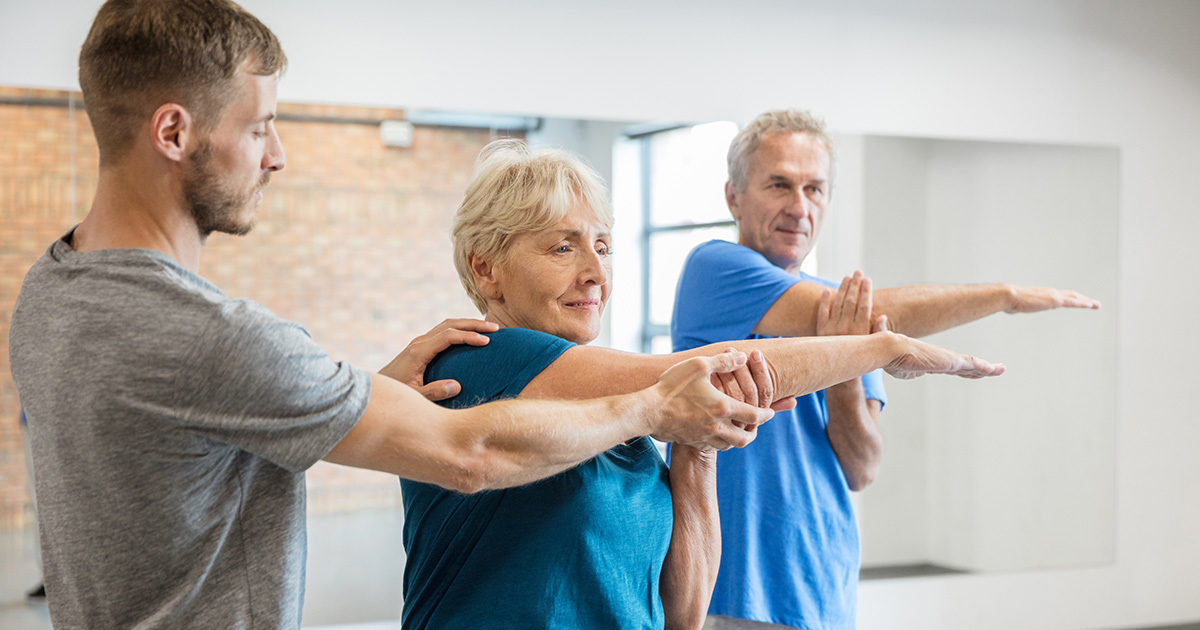Getting Into Pre-Surgery Shape
Prehabilitation programs can help patients experience an easier recovery after surgery
Reviewed by: Justin Nykiel, PT, DPT, MS, Cert.MDT, CSCS
Written by: Lauryn Feil

When you think of physical therapy, you may think of the traditional rehabilitation program you would go through after a surgery or injury. But, much like you wouldn’t run a marathon without training beforehand (or maybe you would, but it would likely be much harder), the same applies to a major surgical intervention. UT Health Austin orthopedic experts in the Musculoskeletal Institute reveal that prehabilitation (prehab) training, physical conditioning, and stamina are all important factors that can help your body before and after surgery.
Prehab is physical therapy, or an exercise-based program, designed for patients before surgery to address deficits in range of motion, flexibility, strength, balance, function, and more. These programs build up the body’s strength to put you in a better position post-surgery. While prehab may be a relatively new concept in healthcare, there are studies showing the benefits of prehab in specific surgeries/populations and more research is being done. It is gaining popularity as a presurgical preparation tool to lower the risk of complications, shorten hospital stays, and enhance patient outcomes.
“Surgery is an invasive and traumatic experience for the body. You’re likely going to lose some function, range of motion, and strength as a result,” says Justin Nykiel, PT, DPT, a physical therapist at the Musculoskeletal Institute. “The goal of prehabilitation is to help patients get stronger, fitter, and more functional ahead of surgical treatment so that when they do experience those expected losses, they aren’t quite as severe.”
There is no one-size-fits-all approach to prehab. Depending on your current abilities and the surgery you’re expected to have, your program is designed with set goals and milestones that are unique to you and your body. For example, if you are an athlete scheduled to have an ACL (the anterior cruciate ligament) reconstruction, a prehab regimen can help improve range of motion, swelling, and muscle activation in the knee before your surgery. However, that program might look very different for someone else depending on their age, current mobility, and other health factors.
“Many patients may believe that they are going to come out of surgery ready to go, but knee surgery alone is not going to allow you to walk pain-free suddenly. Being strong and mobile along with the surgical procedures are what’s going to allow you to walk,” explains Dr. Nykiel. “So, we focus prehab exercises on building up your strength, functional mobility, and capacity as much as possible, and for some patients, certain goals have to be met in prehab before they can even be scheduled for surgery.”
Prehab also allows patients to get to know their physical therapist and practice their post-operative exercises before their procedure. “There’s typically a lot going on leading up to and after surgery,” says Dr. Nykiel. “Patients can be overwhelmed and concerned about putting weight/force on the part of the body that was just operated on, but having the opportunity to get comfortable with their PT and the expected exercises beforehand can reduce anxiety, fear, and stress.”
If you are deciding to move forward with orthopedic surgery, it likely means your condition has not improved with other less invasive treatment options. However, in the past, physical therapy has been used as a last-ditch effort to improve a condition before surgery, and for some patients, it works. Dr. Nykiel explains that because prehab zeroes in on the specific problem you are experiencing, it can often be used to prolong the need for surgery or even avoid surgery altogether.
Dr. Nykiel also says that even though patients may be experiencing high levels of pain or low mobility or function, most patients are highly motivated to be in the best possible state before their operation. “Everyone wants their surgery to go as smoothly as possible, including us PTs, so usually my patients are very motivated in prehab to get stronger and push through any discomfort they may be experiencing,” he says. “We also teach modalities for pain control, whether that means modifying exercises when they have a high pain day or using ice, heat, self-massage, breathing techniques, and more.”
Prehab comes in different formats, varying in length of time depending on your needs before surgery and can be one-on-one training or self-directed at-home exercises. Your prehab plan may also include other pre-surgery lifestyle changes such as dietary changes to meet weight loss goals, smoking cessation, and even mental health building. The Musculoskeletal Institute is a multidisciplinary team that includes surgeons, nurse practitioners, chiropractors, physical therapists, dietitians, health social workers, and more to offer you the full range of care before, during, and after your operation.
“I think most patients can benefit from a prehab program. We do a lot of that here at UT Health Austin, and our goal is to help patients throughout their entire treatment journey,” says Dr. Nykiel. “We want them back to enjoying the activities that matter most to them in life, and there’s no doubt prehab can help you get stronger.”
To learn more about prehab services offered at the Musculoskeletal Institute or to make an appointment, call 1-833-UT-CARES (1-833-883-2737) or visit here.
Are you looking for a gym to workout in that offers a variety of classes and personalized fitness support? Check out membership options at UT RecSports, welcome to anyone! Find more information here.